Key Takeaways
- UPS has eliminated 48,000 jobs in a major restructuring drive
- Third-quarter earnings beat expectations, sending shares up 7%
- Amazon delivery volumes dropped 21% as UPS prioritizes higher-margin business
- Trump’s tariff policies caused 30% drop in China-to-US parcel volume
UPS has cut 48,000 jobs since last year in its most significant strategic shift ever, aiming to boost profits and regain investor confidence. The logistics giant confirmed 34,000 positions were eliminated this year from its US driver and warehouse workforce, following 14,000 management cuts last year.
“We are executing the most significant strategic shift in our company’s history, and the changes we are implementing are designed to deliver long-term value for all stakeholders,” — Carol Tomé, UPS Chief Executive Officer.
Why UPS Is Cutting Thousands of Jobs
Facing persistent investor pressure after underperforming the broader market, UPS launched a massive efficiency overhaul. The company is scaling back unprofitable business lines, including its Amazon delivery partnership.
Amazon deliveries dropped 21% year-on-year in Q3 as UPS focused on higher-margin business.
“Revenue per package in the United States grew 10% in the third quarter from a year earlier,” Ms Tomé told analysts.
Financial Performance Amid Restructuring
Despite the job reductions, UPS’s net income fell to $1.3 billion in Q3 from $1.5 billion a year earlier. Revenue also declined to $21.4 billion from $22.2 billion.
However, adjusted earnings per share of $1.74 beat analyst expectations, sending shares soaring 7% on Tuesday. Still, UPS stock remains down 25% this year, underperforming the S&P 500’s 17% gain.
Tariff Impact on International Business
UPS’s international operations suffered from Trump administration tariffs implemented earlier this year. Parcel volume from China to the US dropped nearly 30% in Q3.
The closure of the “de minimis” loophole in May caused shipments valued under $800 to plunge from 4 million to 1 million packages daily.
Union Response to Layoffs
The Teamsters union had warned it would oppose any contract-violating layoffs. CEO Carol Tomé maintained the company acted within legal boundaries.
“UPS was in compliance with the terms of our contract,” she said.
The cuts have sparked renewed debate about labor protections and automation in logistics, with rivals like FedEx facing similar cost pressures.
UPS’s Future Direction
As UPS adapts to post-pandemic delivery patterns amid slowing e-commerce and rising trade barriers, analysts say the company must balance cost-cutting with service reliability. This represents a pivotal moment for the 117-year-old logistics leader and its workforce.




